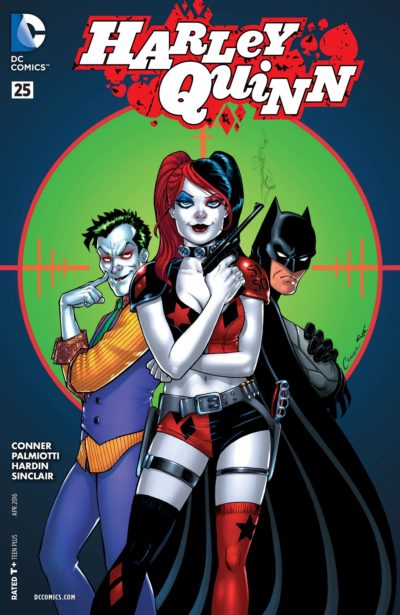This isn’t just any story. This is a superhero origin story.
One day back in 2016, Arkeida Wilson, who was in the throes of a mentally abusive relationship, took a walk in Manhattan to clear her head…and wound up taking the brunt of a terrorist bomb.
Wilson didn’t wind up with nitroglycerin-imbued abilities. She did, however, suffer from PTSD. But what helped her triumph over this emotional evil? Therapy and Harley Quinn #25 (February 2016).
“It was the issue where you see Harley Quinn finally dumping, leaving, brutalizing the Joker” that inspired her to purge her boyfriend from her life. Wilson said, “That, in combination with me talking to my therapist about how I felt, was the reason why [I decided] ‘I don’t have to deal with this anymore.’”
Wilson said, “Fandom has shaped who I am as a person,” going on to admit how it has helped her alleviate her depression, anxiety and PTSD while, “giving me points to think about when it comes to dealing with mental disabilities.” Harley’s bold move inspired her to move on with her life without her own version of the Clown Prince of Crime.
And as with any good superhero, she’s using her strength to help others.
Cut to Danielle Reichman.
Wilson’s friend Reichman, who has long been a mental-health advocate for the geek community, decided she would use the power of fandom to combat the dark forces of mental health issues. Reichman (formerly known as Danielle Ward) recruited Wilson and fellow depression/anxiety sufferer Jenny Cheng to join her in her crusade. The result is a podcast of positivity, Fandom and Wellness.
Fandom and Wellness is still new as far as geeky podcasts go. But it’s already shining the Bat-signal on sensitive issues, such as racism, undiagnosed mental illness, and navigating health insurance, and it’s filled with knowledgable asides, such as the fact that half of all sufferers of anxiety also have depression. The podcasters are startlingly honest about revealing their mental-health secret identities.a
Reichman says, “Collectively, our goal is to put out something that people can relate to and to feel less alone, to advocate going to therapy…. The more you talk about mental health, the more you end the stigma about talking about mental health.”
Wilson, who is Caribbean-American, says she particularly wants “to end the stigma of getting mental health care in the black community, especially within the nerdy black community. [Therapy is] looked down upon in the black community. If people sought help, the better off they would be.”

According to the National Institutes of Health, which released statistics for 2016, 44.7 million Americans suffer from mental illness, nearly one in five adults. This suggests that at conventions like DragonCon, with an attendance of 80,000, perhaps 16,000 attendees have a mental, behavioral, or emotional disorder. Fandom and Wellness speaks directly to those people.
(If you think this number is higher than the Court of Owls’ ambitions, think again. Reichman believes the number is higher even than that, as people who suffer from depression and anxiety can go undiagnosed.)
Cheng, who lends her voice to the show and acts as the group’s Oracle—as in, she handles the technology—is enthusiastic about the trio’s mission: “I want to make people feel like they’re not alone, that there are people out there who have the exact same feelings that they do. And it’s totally okay. […] Listen to us if you want to feel less alone.”
She also provides much of the show’s snark: Cheng says she teamed up with her pals because “I thought that everyone needs to hear my opinion.”
Wilson explains why Fandom and Wellness should be on the radar of those who are seeking to banish the darkness in their own minds: “This is a great intersection between fandom and mental health. We…talk about series’ we all love in fandom and how they pertain to how we perceive the world and how it affects our mental psyche and how to better yourselves from it.”
By opening up about painful issues with sensitivity and wit and framing them in a geeky context, Cheng, Reichman, and Wilson are the superheroes that fandom needs and deserves.
You don’t need Batman’s cryptographic sequencer to access Fandom and Wellness. It’s available online and wherever you listen to podcasts.

More Great Geeky Community Stories!
- How MYSTERIUM Helped This Man With Dyslexia Communicate
- How One Woman Living With Lupus Uses Board Games As Therapy
- Meet the NASA Engineer Who Explores How Games Impact People In His Podcast
Image credits: Fandom and Wellness, DC Comics
Editor’s note: Interview excerpts have been lightly edited for clarity.

